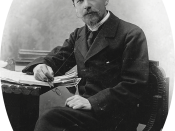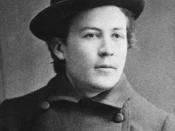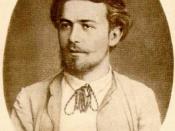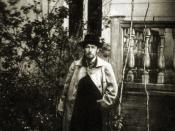�PAGE � �PAGE �4�
In the short story "Misery" by Anton Chekhov, I identified the problem of loneliness, as the absence of reciprocal understanding. I feel the love that A. Chekhov expresses to the ordinary person like Iona Potapov. The author writes about little things that mean a lot. Deep thoughts are hiding under true life twists and turns.
Chekhov tells us a story of the main character, penurious Iona Potapov. He, as a sledge driver, meets various types of people and spends most of his time with them. It may seem that Iona should not be lonely, as he is always surrounded with people. But when we read between the lines we can see the crying soul of Iona. Iona does not have a wife, he just lost his son, and he is left with his horse and his soul is dancing with pain. Misery is preying on him from inside.
His passengers are insincere to themselves and to Iona; this makes his pain even worse. "Do you hear you old plague? I'll make you smart. If one stands on ceremony with fellows like you one may as well walk. Do you hear, you old dragon? Or don't you care a hang what I say?" (71). "Misery" faces loneliness as its main problem and indirectly asks us to be better, sincere and understanding people.
The author shows some serious problems to his readers. "Misery" explains a significance of moral principles. This story is about people that are satisfied in their lives, and who feel they are above other people. This story is about people who are not able to understand each other, and who do not know the significance of sympathy. "And Iona turns round to tell them how his son died, but at that point the hunchback gives a faint sigh and announces that, thank God! they have arrived at last" (71). It feels like it is difficult for other people to understand his grief, for those that never had this feeling before. Iona does not lose this faith and still tries to find someone who will listen to him. He is childlike when he tries to see support and sensibility spark in people's eyes. Unfortunately, he bumps into a wall of incomprehension and indifference.
How often do we hear about indifference? We wonder in disgust, and we do not think it could be said about us. How often we forget about grievances we cause to our closest people. Sometimes so little is needed: to listen, to smile or just to say an amiable word, but sometimes that is all we need. It would not take too much effort for "Misery" characters to give just a little bit of kindness, gentleness and patience, so that Iona Potapov would feel better. We all need to shy away from our indifference to make our lives brighter.
A. Chekhov knows how to write simply about huge importance things. That is what he did writing "Misery". There Chekhov faces the biggest perennial problem of mankind - inner communication, indifference for someone's loss and grief. The feeling of heaviness and melancholy stays in place while reading this short story. The main character of the story, Iona, is lost in a busy city, where everybody rushes without paying attention to someone who needs it most. "The little mare munches, listens, and breathes on her master's hands. Iona is carried away and tells her all about it" (72). This fragment shows that Iona lost his faith in people, and he finds a warm heart that would understand his grief. Iona found a real friend - his old mare, which always stays around.
Anton Chekhov is a great artist in words. He is able to convey his thoughts in this short story and to show a big picture of Iona's life. The author reveals a cruel atmosphere that surrounds Iona, "Big flakes of wet snow are whirling lazily about the street laps, which have just been lighted, and lying in a thin soft layer on roofs, horses' backs, shoulders, caps" (69). It is not just dusk and snow; it is a symbol of emptiness, hopelessness and apathy. It allows us to understand how small the human being is in this cruel universe. Chekhov pictures the big city with heartless people, where inside the person could be alone. Four times Iona tried to start a conversation and all four times he tried to share his grief. He wants to talk about his loss about his sorrow. He even states, "It would be even better to talk to women. Though they are silly creatures, they blubber at the first word" (72). No one was interested in his words. Iona could not let his grief out so his sorrow was getting bigger. "His misery is immense, beyond all bounds. If Iona's heart were to burst and his misery to flow out, it would flood the whole world, it seems, but yet it is not seen" (71).
Chekhov is like a psychologist. He shows how big the sorrow could be and how lonely a human could get. This theme is relevant for all of us. We all rush through our lives without thinking of others. We rarely think that we all could get to a situation pictured in "Misery" by Anton Chekhov.
Works cited
Chekhov, Anton. "Misery." An Introduction to Literature: Fiction, Poetry, Drama. 13th ed. Ed. Barnet, Sylvan, Burto, William, and Cain, William E. New York: Pearson/Longman, 2004. 69-72.





